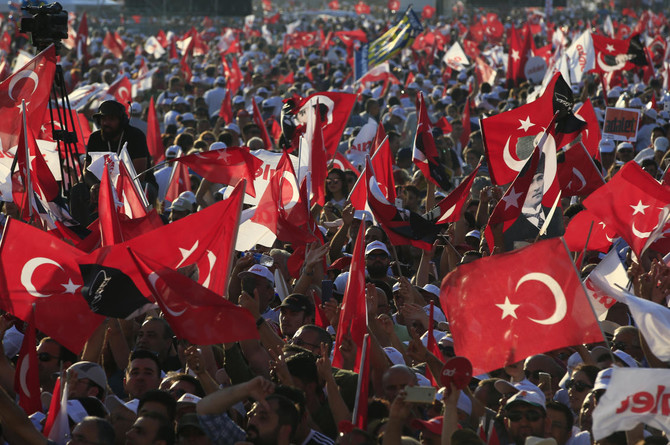ISTANBUL: Turkey on Saturday holds an intense series of events to celebrate the first anniversary of the defeat of last year’s attempted coup, showcasing President Recep Tayyip Erdogan’s grip on power on the heels of a new purge of state employees.
The authorities have declared July 15 an annual national holiday of “democracy and unity,” billing the foiling of the putsch as a historic victory of Turkish democracy.
Two hundred and forty nine people, not including the plotters, were killed when a disgruntled faction in the army sent tanks into the streets and war planes into the sky in a violent bid to overthrow Erdogan after one-and-a-half decades in power.
But they were thwarted within hours as the authorities regrouped and people poured into the streets in support of Erdogan, who blamed followers of his ally turned nemesis, the US-based preacher Fethullah Gulen.
The authorities embarked on the biggest purge in Turkey’s history, arresting 50,000 people and sacking over 100,000 more. Erdogan also shored up his position by winning an April 16 referendum on enhancing his powers.
In the latest dismissals ordered just hours before the commemorations were due to begin, another 7,563 police, soldiers and other state employees were fired under the state of emergency that has been in place since July 20 last year.
A decree said those targeted were “linked to terror organizations, or groups determined to have been acting against the state’s national security.”
Earlier this month, Turkey also detained the country director of Amnesty International and over half a dozen rights defenders on charges of belonging to a terror group.
Gulen has always denied involvement in the coup bid and in a new statement Friday said the accusations were “baseless, politically motivated slanders” and slammed a “witch hunt” of Erdogan’s critics.
The scale of Saturday’s nationwide commemorations is aimed at etching July 15, 2016 into the minds of Turks as a key date in the history of the modern state founded in 1923 out of the ruins of the Ottoman Empire.
“From now on, nothing will be as it was before July 15,” Erdogan said in a speech on Thursday, describing the date as a “turning point” in Turkish history.
He compared the defeat of the coup to the World War 1 1915 Battle of Gallipoli where Ottoman troops famously withstood an onslaught by invading Allied soldiers in what became one of the founding narratives of the modern state.
Giant posters designed by the presidency have sprung up across billboards in Istanbul showing gaudy paintings that portray the key events of the coup night, including the surrender of the putschist soldiers.
“The epic of July 15,” says the slogan. However some have criticized the posters for belittling the Turkish army.
Turkey’s opposition put political disputes aside on the night of the attempted coup.
But this has frayed since the April 16 referendum, with critics accusing Erdogan of pursuing one man rule and cracking down on anyone who expresses dissent.
The commemorations will for Erdogan be a helpful riposte to a giant opposition rally — the largest in years — held last Sunday by the head of the Republican People’s Party (CHP) Kemal Kilicdaroglu at the end of a nearly one month foot march pushing for “justice” in Turkey.
Public transport is free in Istanbul over the weekend while mobile operator Turkcell has sent text messages to clients promising them a free extra gigabyte of data from July 15.
Meanwhile, illuminated anti-coup slogans have been hung between the minarets of some of Istanbul’s greatest Ottoman mosques.
After a special session of parliament starting at 1000 GMT, most of the celebrations will be taking place deep into the night.
Erdogan, at the center of the events, will to take part in a people’s march on the Istanbul bridge across the Bosphorus that saw bloody fighting a year ago.
The bridge has since been renamed Bridge of the Martyrs of July 15.
At midnight local time (2100 GMT) people across Turkey will take part in “democracy watches,” rallies commemorating how people poured out into the streets.
Erdogan will return to Ankara and at 2300 GMT give a speech in parliament to mark the time it was bombed.
A monument to those killed will then be unveiled outside his palace in the capital as the dawn call to prayer rings out.

























